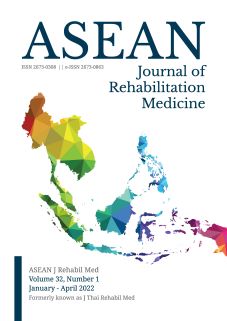The Value of Electrodiagnostic Studies in Diagnosis and Management of Neuromuscular Disorders: A Retrospective Study from a Tertiary-Care Hospital in Thailand
Keywords:
electrodiagnosis, electromyography, neuromuscular diseasesAbstract
Objectives: To evaluate the value of electrodiagnostic studies (EDx) in diagnosis and management of neuromuscular disorders.
Study design: Retrospective study.
Setting: Maharat Nakhon Ratchasima Hospital, Nakhon Ratcha-sima, Thailand.
Subjects: New patients who were referred to EDx laboratory, Maharat Nakhon Ratchasima Hospital between January 1, 2019 and December 31, 2020.
Methods: General demographics, referring physician specialty, referral diagnosis, diagnosis after EDx, impact of EDx on diagnosis and management were reviewed retrospectively. The impact of EDx was classified into confirmed, changed, and no added value. Management by referring specialists after receiving EDx reports including investigation, consultation and treatment were recorded. The association between variables and change in diagnosis and management after EDx, were analyzed using
multivariable analysis.
Results: Of 856 patients, the diagnosis was changed and confirmed after EDx in 28.4% and 69.3% respectively. EDx results led to a change in management for 29%. Referral diagnosis of radiculopathy, no referral diagnosis, female patient and neurologists’ referral were major contributing factors to a change in diagnosis with odds ratios (95% CI) of 3.67 (1.52, 8.85), 2.61 (1.44, 4.73), 1.79 (1.23, 2.56) and 1.79 (1.20, 2.67) respectively. While referral diagnosis of neuromuscular junction (NMJ) disease,
motor neuron disease (MND) and referred by orthopedic surgeons were the top three variables correlated with a change in management with odds ratios (95% CI) of 3.81 (1.8, 8.08), 2.85 (1.11, 7.37) and 2.24 (1.2, 4.2) respectively.
Conclusions: EDx is a valuable investigation that confirms (69.3%) or changes (28.4%) the diagnosis and guides the appropriate management (29%) in patients with neuromuscular disorders.
Keywords: electrodiagnosis, electromyography, neuromuscular diseases
References
Cho SC, Siao-Tick-Chong P, So YT. Clinical utility of electrodiagnostic consultation in suspected polyneuropathy. Muscle Nerve. 2004;30:659-62.
Becker SJE, Makanji HS, Ring D. Changes in treatment plan for carpal tunnel syndrome based on electrodiagnostic test results. J Hand Surg Eur. 2004;39:187-93.
Haig AJ, Tzeng HM, LeBreck DB. The value of electrodiagnostic consultation for patients with upper extremity nerve complaints: a prospective comparison with the history and physical examination. Arch Phys Med Rehabil. 1999;80:1273-81.
Patel AT, Gaines K, Malamut R, Park TA, Toro DRD, Holland N, et al. Usefulness of electrodiagnostic techniques in the evaluation of suspected tarsal tunnel syndrome: an evidence-based review. Muscle Nerve. 2005;32:236-40.
Marciniak C, Armon C, Wilson J, Miller R. Practice parameter: utility of electrodiagnostic techniques in evaluating patients with suspected peroneal neuropathy: an evidence-based review. Muscle Nerve. 2005;31:520-7.
Cho SC, Ferrante MA, Levin KH, Harmon RL, So YT. Utility of electrodiagnostic testing in evaluating patients with lumbosacral radiculopathy: an evidence-based review. Muscle Nerve. 2010;42:276-82.
Kothari MJ, Blakeslee MA, Reichwein R, Simmons Z, Logigian EL. Electrodiagnostic studies: are they helpful in clinical practice? Arch Phys Med Rehabil. 1998;79:1510-1.
Perry DI, Tarulli AW, Nardin RA, Rutkove SB, Gautam S, Narayanaswami P. Clinical utility of electrodiagnostic studies in the inpatient setting. Muscle Nerve. 2009;40:195-9.
Nardin RA, Rutkove SB, Raynor EM. Diagnostic accuracy of electrodiagnostic testing in the evaluation of weakness. Muscle Nerve. 2002;26:201-5.
Shepherd MM. Clinical outcomes of electrodiagnostic testing conducted in primary care. J Am Board Fam Med. 2010;23:584-90.
Lindstrom H, Ashworth NL. The usefulness of electrodiagnostic studies in the diagnosis and management of neuromuscular disorders. Muscle Nerve. 2018;58:191-6.
Cocito D, Tavella A, Ciaramitaro P, Costa P, Poglio F, Paolasso I, et al. A further critical evaluation of requests for electrodiagnostic examinations. Neurol Sci. 2006;26:419-22.
Mondelli M, Aretini A, Greco G. Requests of electrodiagnostic testing: consistency and agreement of referral diagnosis. What is changed in a primary outpatient EDX lab 16 years later? Neurol Sci. 2014;35:669-75.
Downloads
Published
How to Cite
Issue
Section
License
Copyright (c) 2021 ASEAN Journal of Rehabilitation Medicine

This work is licensed under a Creative Commons Attribution-NonCommercial-NoDerivatives 4.0 International License.






